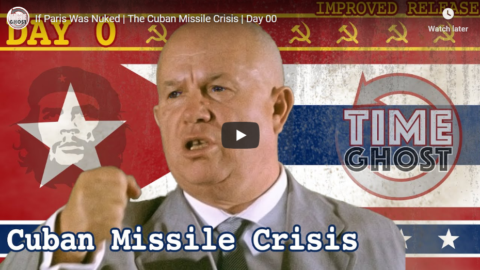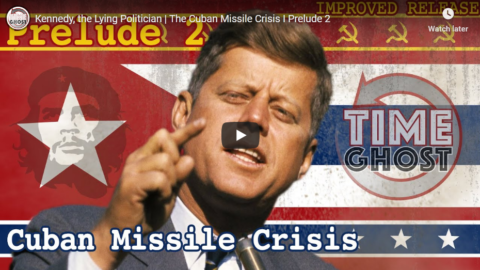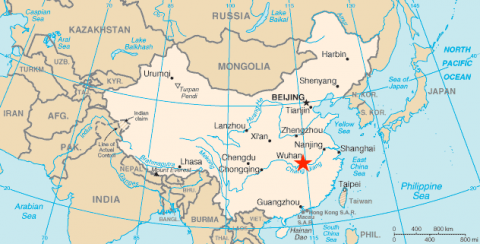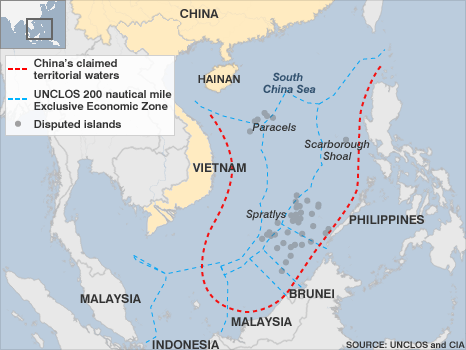TimeGhost History
Published 6 Jul 2020The year before Soviet Premier Nikita Khrushchev places nuclear missiles on Cuba, the Soviets blow up the biggest atomic bomb ever detonated. If it blew up over Paris, millions would die.
Join us on Patreon: https://www.patreon.com/TimeGhostHistory
Try Nukemap here: https://nuclearsecrecy.com/nukemap/
Hosted by: Indy Neidell
Written by: Spartacus Olsson
Director: Astrid Deinhard
Producers: Astrid Deinhard and Spartacus Olsson
Executive Producers: Astrid Deinhard, Indy Neidell, Spartacus Olsson, Bodo Rittenauer
Creative Producer: Joram Appel
Post-Production Director: Wieke Kapteijns
Research by: Spartacus Olsson
Edited by: Daniel Weiss
Sound design: Marek KaminskiColorizations:
– Carlos Ortega Pereira (BlauColorizations) – https://www.instagram.com/blaucoloriz…Sources:
RIA Novosti archive, image #35173, image #793499.
https://flickr.com/photos/102221463@N…From the Noun Project:
Mountain – By Harold Weaver
Mushroom Cloud – By yanti, ID
destroyed house – by Gan Khoon Lay
Hospital – By Hare Krishna, IN
Fire Station – By Florian Maier
School – David
Church – by Karla Design
Paris – By Vonn WeisenbergerSoundtracks from Epidemic Sound:
– “Cold Eyes” – Elliot Holmes
– “Scope” – Got Happy
– “Juvenile Delinquent” – Elliot Holmes
– “Moving to Disturbia” – Experia
– “Zoot Suit” – Elliot Holmes
– “From the Depths” – Walt Adams
– “Car Chase in Virginia” – White BonesArchive by Screenocean/Reuters https://www.screenocean.com.
A TimeGhost chronological documentary produced by OnLion Entertainment GmbH.
July 7, 2020
If Paris Was Nuked | The Cuban Missile Crisis | Day 00
July 2, 2020
Kennedy, the Lying Politician | The Cuban Missile Crisis I Prelude 2
TimeGhost History
Published 1 Jul 2020The Cold War grows gets more and more tense as both the USSR and the US try to get the upper hand through the volume of nuclear weapons and strategic launching sites – including Cuba.
Join us on Patreon: https://www.patreon.com/TimeGhostHistory
Hosted by: Indy Neidell
Written by: Spartacus Olsson
Director: Astrid Deinhard
Producers: Astrid Deinhard and Spartacus Olsson
Executive Producers: Astrid Deinhard, Indy Neidell, Spartacus Olsson, Bodo Rittenauer
Creative Producer: Joram Appel
Post-Production Director: Wieke Kapteijns
Research by: Spartacus Olsson
Edited by: Daniel Weiss
Sound design: Marek KaminskiColorizations:
– Carlos Ortega Pereira (BlauColorizations) – https://www.instagram.com/blaucoloriz…
– Daniel WeissSources:
– New Georgia EncyclopediaSoundtracks from Epidemic Sound:
– “Cold Eyes” – Elliot Holmes
– “Juvenile Delinquent” – Elliot Holmes
– “Nightclub Standoff” – Elliot Holmes
– “Scope” – Got Happy
– “Zoot Suit” – Elliot Holmes
– “Car Chase in Virginia” – White Bones
– “When They Fell” – Wendel Scherer
– “Kissed by Thunder” – Elliot HolmesArchive by Screenocean/Reuters https://www.screenocean.com.
A TimeGhost chronological documentary produced by OnLion Entertainment GmbH.
April 5, 2020
China’s geostrategic box
ESR looks at the concerns that China may be considering starting a war with the United States in the wake of the Wuhan Coronavirus:
To understand how limited the PRC’s war options are, we can start with a grasp on how difficult and unsatisfying any war of conquest would be due to the geographic box China is in. The obstacles around it are formidable.
To the south, the Himalayan massif makes all of South Asia other than a narrow coastal plain on the Southeast Asian peninsula inaccessible to serious troop movements. There are no roads or rail links. The last time the Chinese tried pushing in that direction, in 1979, they were unable to sustain an offensive at any distance from their railheads and withdrew after less than a month. Their war aim – forcing the North Vietnamese to withdraw its troops from Cambodia – failed.
To the west, the vastness and comparatively undeveloped state of China’s western hinterland is a serious logistical problem before one even gets to the border. At the borders, the Tien Shan and Pamir ranges present a barrier almost as formidable as the Himalayas. External road and rail links are poor and would be easily interdicted.
To the north, movement would be easier. It might be just within logistical possibility for the PLA to march into Siberia. The problem with this idea is that once you’ve conquered Siberia, what you have is … Siberia. Most of it, except for a small area in the south coastal region of Primorsky Kraye, is so cold that cities aren’t viable without food imports from outside the region. Set this against the risks of invading a nuclear-armed Russia and you don’t have a winning proposition.
To the east is the South China Sea. The brute fact constraining the PRC’s ambitions in that direction is that mass movement of troops by sea is risky and difficult. I recently did the math on Chinese sealift craft and despite an expensive buildup since the 1980s they don’t have the capacity to move even a single division-sized formation over ocean. Ain’t nobody going to take Taiwan with one division, they’ve has too much time to prepare and fortify over the last 60 years.
The PRC leadership is evil and ruthless, but it’s also cautious and historically literate and can read maps. Accordingly, the People’s Liberation Army is designed not to take territory but to hold the territory the PRC already has. Its mission is not conquest but the suppression of regional warlordism inside China itself. The capability for the PLA to wage serious expeditionary warfare doesn’t exist, and can’t be built in the near-term future.
It’s often said that the danger of aggressive war by China is a function of the huge excess of young men produced by covert sexual selection and the one-child policy. But to expend those young men usefully you need to get them to where they can fight and are motivated by some prospect of seizing the wives unavailable for them at home. The PRC can’t do that.
The military threat from China is, therefore, a function of what it can do with its navy, its airpower, and its missiles. And what it can do with those against the U.S. is upper-bounded by the fact that the U.S. has nuclear weapons and would be certain to respond to a PRC nuclear or EMP attack on the U.S. mainland by smashing Chinese cities into radioactive rubble.
Within the constraints of conventional warfare waged by navy and air force it is difficult to imagine an achievable set of PRC war aims that gains more than it costs.
It’s possible — even likely — that the Chinese military has something like the oft-rumoured “ship-killer missiles” that might be able to cripple or sink an American carrier … if it was in range. That makes the South China Sea, the East China Sea, and the west coast of Japan a possible no-go area for US Navy carrier strike groups. A good defensive weapon system to have on hand in case relations with the outside world go “hot”, but not a strategic game-changer. Nobody would be likely to consider anything as dangerous as a seaborne invasion of mainland China, even without the threat of wonder weapons like the ship-killer. And good defensive weapons won’t secure the trade routes that China depends on outside coastal waters.
In a lot of ways your strategic situation is like a scaled-up version of Japan’s in 1941 – you could seize the initiative with a Pearl-Harbor-like initial shock, but you can’t wage a long war because without sealane control you’ll run out of key feedstocks and even food rather rapidly. And unlike the Japanese in 1941, you don’t have the kind of serious blue-water navy that you’d need for sealane control outside the First Island Chain – not with just two carriers you don’t.
There is one way an aggressive naval war could work out in your favor anyway. You can count on the U.S.’s media establishment to be pulling for the U.S. to lose any war it’s in, especially against a Communist or Socialist country. If your war goals are limited to ending U.S. naval power projection in the Western Pacific, playing for a rapid morale collapse orchestrated by agents of influence in the U.S. is not completely unrealistic.
It’s playing with fire, though. One problem is that before you launch your attack you don’t know that your sucker punch will actually work. Another is that, as the Japanese found out after Pearl Harbor, the American public may react to tragic losses with Jacksonian fury. If that happens, you’re seriously screwed. The war will end with your unconditional surrender, and not sooner.
Update: Bone-headed typo in the headline fixed. It’s funny how you can’t see ’em until just after you click the Save button…
January 28, 2019
The Cold War – OverSimplified (Part 2)
OverSimplified
Published on 24 Jan 2019
March 3, 2018
Cuban Missile Crisis – Black Saturday – Extra History – #3
Extra Credits
Published on 1 Mar 2018*Sponsored by DomiNations: https://smarturl.it/CubanMissile1
With simultaneous nuclear tests by both the US and Russia, and tense miscommunications among troops on the ground, in the air, and on the water, the doomsday clock ticked to 11:59 PM for one fateful day.
February 23, 2018
Cuban Missile Crisis – Eyeball to Eyeball – Extra History – #2
Extra Credits
Published on 22 Feb 2018Sponsored by DomiNations: https://smarturl.it/CubanMissile1
After President Kennedy’s television address, tensions are rising. Fidel Castro is getting annoyed at the US and Soviet Union alike, and everyone else has their own ideas on what retaliation looks like.
February 17, 2018
Cuban Missile Crisis – I: The Failed Checkmate – Extra History
Extra Credits
Published on 15 Feb 2018An eye for an eye, a missile for a missile — that’s how the saying goes, right? So thought the Soviet Union and the United States in the early fall of 1962, kicking off a 13-day staring contest that scared the world.
January 28, 2018
Day 13 Cuban Missile Crisis – The End to End All Things and Almost Everything
TimeGhost
Published on 21 Dec 2017On Sunday, 28 October, 1962 the Cuban Missile Crisis is supposed to end, but there are still two nuclear armed Soviet submarines in the waters around the island hunted by the US Navy. And what about Fidel Castro?
January 27, 2018
Day 12 Cuban Missile Crisis – Black Saturday, nuclear war on autopilot…
TimeGhost
Published on 7 Dec 2017On October 27, 1962 a deal to resolve the Cuban Missile Crisis is ever so close, but then almost everything that can go wrong, goes wrong. Political confusion between the leaders, lost and shot down airplanes, errant nuclear armed submarines and exhaustion takes its toll. For those immediately involved it will go down in memory as the Black Saturday.
January 26, 2018
Day 11 Cuban Missile Crisis – Will President Kennedy invade Cuba after all?
TimeGhost
Published on 30 Nov 2017On 26 October 1962, USSR Premier Nikita Khrushchev is preparing to offer the US an olive branch. Meanwhile US President John F Kennedy continue to plan an invasion of Cuba. While the politicians make new plans, their previous military plans take on a life of their own
January 25, 2018
Day 10 Cuban Missile Crisis – Showdown at the U.N. Corral
TimeGhost
Published on 27 Nov 2017On October 25, 1962 while the US Navy are looking for something to do in the Caribbean, both USSR Chairman Khrushchev and US President Kennedy are questioning the success of their actions. Meanwhile US Ambassador to the UN Adlai Stevenson is about to face off with USSR Ambassador to the UN, Valerian Zorin in a historic showdown at the United Nations headquarters in New York.
January 24, 2018
Day 9 Cuban Missile Crisis – Blockade starts and low altitude flybys over Cuba
TimeGhost
Published on 23 Nov 2017On October 24, 1962 the US led blockade on Cuba goes into effect, but it’s not the be the showdown that it looks like! In the same time the US Navy starts flying RF8 Crusader reconnaissance jets 400 feet over the missile sites on Cuba, to see what’s really going on. As the jets roar over the heads of the Cuban and Soviet soldiers, the crisis deepens.
January 23, 2018
Day 8 Cuban Missile Crisis – Kennedy and Khrushchev face reality
TimeGhost
Published on 20 Nov 2017On October 23, 1962 as the blockade on Cuba is being prepared, US President John F. Kennedy and USSR Chairman Nikita Khrushchev question their own actions realising that they might have gone a step too far. By now the dice have been rolled and it’s too late to stop the wheels from spinning. Both leaders try to justify their decisions to maintain their political power.
January 22, 2018
Day 7 Cuban Missile Crisis – USA announces a blockade on Cuba
TimeGhost
Published on 16 Nov 2017On October 22, 1962 the world is shocked to find out that the US and the USSR are facing off with nuclear arms in the Caribbean. In the world’s first televised announcement of an international military crisis, US President John F. Kennedy sets off panic and sudden fear of a third world war, with nuclear arms involved.
January 21, 2018
Day 6 Cuban Missile Crisis – Mr. President did you say blockade, or invade Cuba?
TimeGhost
Published on 13 Nov 2017On October 21 1962, politicians and military in both the US and in the USSR seem to have contradictory views on what to do next. The questions on the table; blockade AND invade Cuba, or just a quarantine? Should the Soviet local commanders on Cuba get to play with the little nukes as they like, or rather wait for permission? When it’s only the world as we know it that’s at stake…







